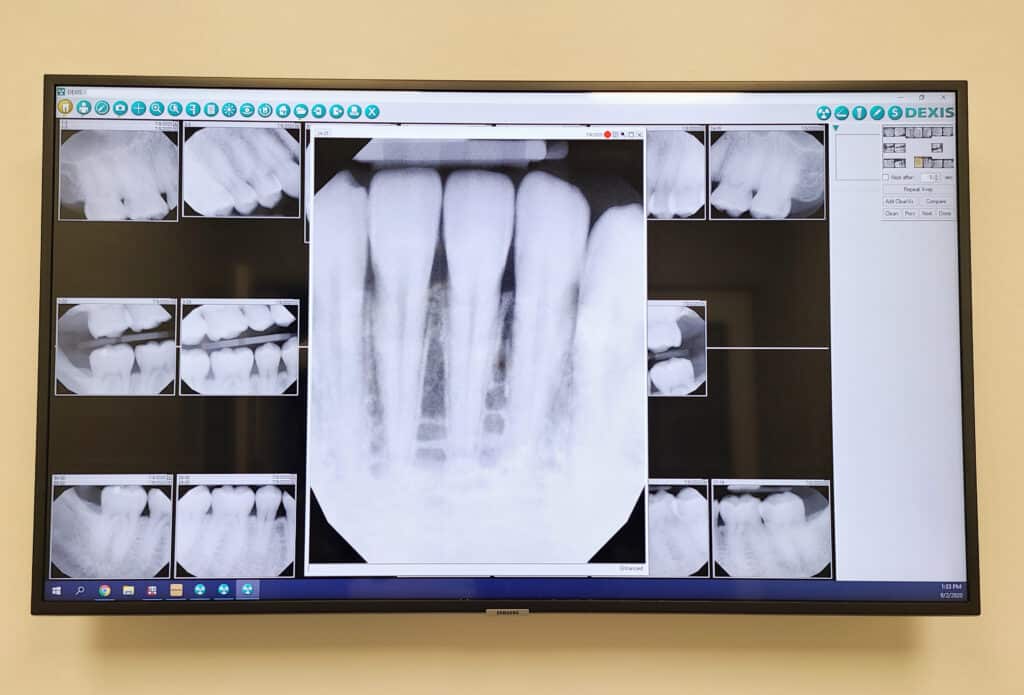Patient-focused and gentle approach to tooth extraction
At Sloan Creek Dental, we take a conservative approach to dentistry as we do our best to try and preserve your natural teeth. However, there are situations where we may recommend a tooth to be extracted if it can’t be saved, such as a decaying tooth that is at risk of damaging the surrounding teeth. If a tooth does need to be extracted, we will thoroughly explain why we recommend it and provide treatment options to reestablish proper oral health. Thankfully, Dr. Feng is highly skilled in this procedure and will personalize a treatment plan that will make you feel comfortable and at ease during this time.

There are a number of reasons why you may need to have a tooth extracted. During your exam, your dentist will take care of you and help you understand what is causing pain, discomfort, or other problems in your mouth. They will then be able to recommend the best treatment plan for you.Common reasons for needing tooth extraction include:
Flexible Hours – Emergency Appointments Available
Personalized compassionate dental care
Experienced & Compassionate Team of Dentists
Sedation options available for anxious patients
Your smile is important to us, and we emphasize the preservation of your natural teeth and gums, but sometimes a tooth extraction is the most effective treatment for oral disease. If a tooth extraction is necessary, here’s what you can expect if you opt for this treatment:
A tooth extraction procedure always involve the use of a local anesthetic. During this process, the local anesthetic will completely numb the surrounding area, so you don’t have to worry about it being painful. If you experience anxiety at the dentist or you think you will want dental sedation during your oral surgery, please let our team know, and we will be more than happy to add sedation to your treatment plan. Sloan Creek Dental offers nitrous oxide and oral conscious sedation, both very safe and effective forms of dental sedation that can help reduce anxious thoughts and promote a sense of relaxation during the extraction.
After the examination, Dr. Feng will discuss your treatment plan with you so you may understand the specifics of the dental procedure. A local anesthetic is used to numb the area and make the procedure more comfortable. Depending on the treatment plan, there are two types of extractions done by a general dentist or an oral surgeon:
After the procedure, Dr. Feng will clean the socket and place gauze on it to promote clotting. Depending on the treatment, you may be prescribed painkillers to help with the pain.
Following the procedure, we will provide you with aftercare instructions and a recovery plan to heal your gums. The healing process can vary depending on the severity of the problem and what type of extraction you’re having. However, recovery time is generally rather quick, and over-the-counter pain medication in addition to applying ice to the treated area can help reduce swelling. Here are some guidelines to help with the recovery:
After your tooth removal, we understand that thinking of a tooth replacement won’t be top of mind during your recovery. However, it’s important to consider tooth replacement options sooner than later. With the tooth root no longer present, the bone in your jaw will begin to deteriorate, leaving your surrounding teeth to shift out of place, cause unnecessary pain, and may cause further complications in the surrounding area. There are two options to replace a single tooth.
After you’ve lost a tooth, the healing process can take approximately one to two weeks. New bone and gum tissue will grow into the space where your tooth was removed, but over time the remaining teeth surrounding the area may shift, affecting your bite and making chewing difficult.
When the tooth is being loosened and extracted, you may feel a slight pressure, but no pain. You might also hear some sound, which is normal in order to remove the tooth.
It may be cheaper to pull a tooth than to repair it, but the ultimate cost of replacing the tooth will be higher in the long term and will take much longer to deal with. If given the option to save the tooth or extract it, Dr. Feng will always recommend saving the tooth. Once the tooth is removed, bone loss in the jaw may occur, resulting in one or more teeth shifting.
As your local dentist near the Allen and Fairview areas, we are here to help you with any questions or concerns that you might have about your dental health. If you want to learn more about how to improve your dental health, questions about dental extractions, or other reInvisalign process, other restorative treatment options, feel free to call our office,and we’ll be happy to help with your oral care. You can reach us at our Fairview, TX dental office to schedule an in-person consultation with us today – 972-468-1440.
Our dental office is located in Fairview, Texas, and our patients visit us from across the surrounding areas, including Allen, Plano, McKinney, and Lucas.
Just about anything you need under one roof. Your Fairview dentist near Allen and McKinney has your family covered.